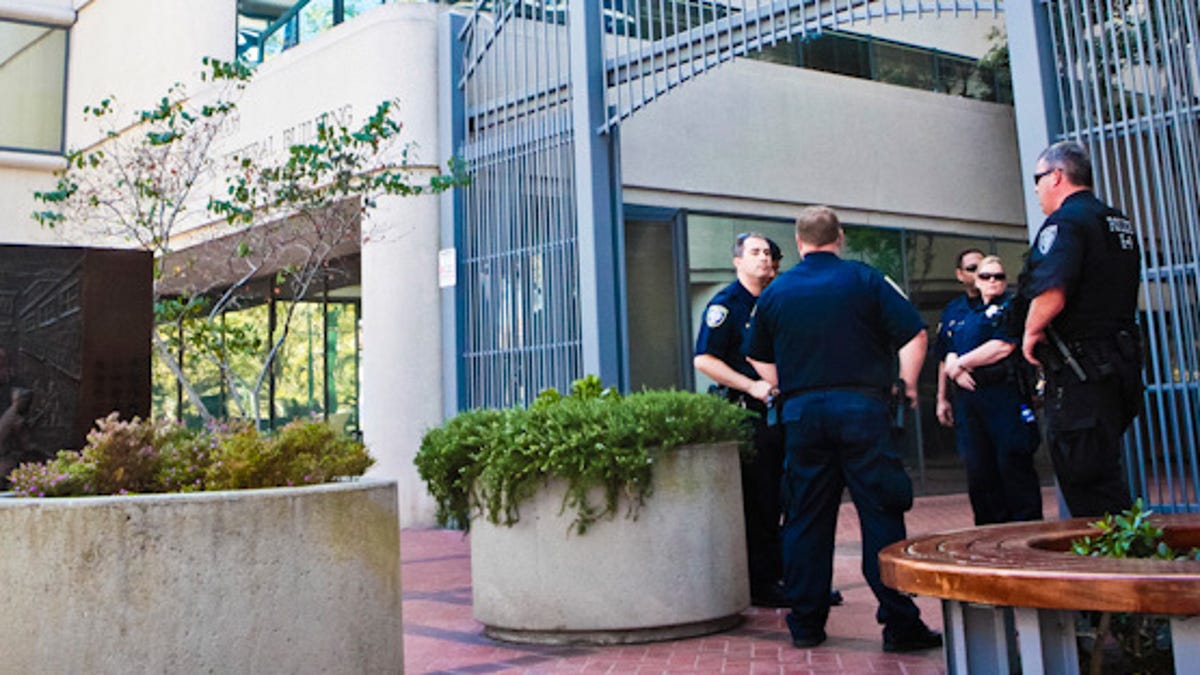Alleged Anonymous members plead not guilty
The Anonymous 14 plead not guilty to conspiracy and computer hacking charges related to last year's denial-of-service attacks against PayPal's Web site.

SAN JOSE, Calif.--Anonymous may have became a little less anonymous this afternoon.
One by one, as alleged members of Anonymous heard their full legal names read aloud in a courtroom here, they stood before a federal judge and acknowledged that, yes, they understood the nature of the remarkably severe criminal charges that were filed against them in July.
The 14 defendants are facing felony charges of conspiracy and computer hacking stemming from last December's distributed denial-of-service, or DDoS, attack against PayPal. It was organized in response to PayPal halting donations to WikiLeaks a few days earlier.
Magistrate Judge Paul Grewal handled the rapid-fire arraignments with dispatch: the younger, indigent defendants were awarded court-appointed attorneys. Defendants with plans to visit family members were granted permission to travel.
The results of this preliminary court appearance were the same in each case. "A plea of not guilty will be entered," Grewal repeated. The next court date for what will surely be called the Anonymous 14 will be November 1.
Perhaps because Anonymous has no real fixed structure, it has no real fixed membership, a characteristic not calculated to endear it to law enforcement. Which may be why police around the globe have become so determined to unmask the activists who have electronically assaulted commercial and governmental Web sites in Anonymous' name using a DDoS tool colorfully named the Low Orbit Ion Cannon, or LOIC.
Four people in the Netherlands and one in the U.K. were arrested in July. More arrests happened in Spain. Authorities in Turkey detained 32 people a month earlier (that was retribution for an attack on Turkish government Web sites, which in turn was retribution for the country's Internet censorship).
Anonymous' problem is that LOIC isn't exactly, well, anonymous. It's an open-source utility that attempts to flood its target with connections, akin to how someone trying to disrupt a toll-free number might enlist their friends to repeatedly dial and hang up. And just as telephone connections can be traced, unless LOIC-users enlist anonymizing services like Tor, their Internet connections also can be traced back to a person or physical address.
Court staff were anticipating protests by Anonymous supporters like what happened in San Francisco last month after the subway authority briefly shut down cell service. At least eight deputy U.S. Marshals lined the courtroom walls, and far more were milling around the ground floor. But not even one protester materialized (a deputy U.S. Marshal quipped that "this isn't San Francisco!").
Grewal did curb the defendants' Internet use, a practice that has become commonplace in computer crime cases, agreeing with Justice Department prosecutor Matthew Parrella that they could only use computers "for purposes of work and school and communication with their attorneys."
Other conditions include, Parrella said, "no Internet Relay Chat" and no use of Twitter (which has been a boon to Anonymous in coordinating DDoS attacks). Other social networks are allowed, but "pre-trial services can examine" the defendants' computers. Deleting files is also prohibited.
Then the conversation drifted into the slightly surreal. Parrella proposed that the defendants be prohibited from contacting "other members of Anonymous or LulzSec." (LulzSec is responsible for an intrusion into Sony's servers and a release of sensitive files belonging to Arizona law enforcement.)
That raises the obvious question: How do you know if you're talking to someone who's affiliated with Anonymous?
You can't, or don't. An attorney for Mercedes Haefer, 20, a college student at the University of Nevada, Las Vegas, who allegedly is known as "No" and "MMMM," objected to the Justice Department's proposal.
"Anonymous is anonymous," said defense counsel Stanley Cohen. He successfully argued that the language should be modified to preclude only intentional--instead of accidental--contact with Anonymous and LulzSec members.

